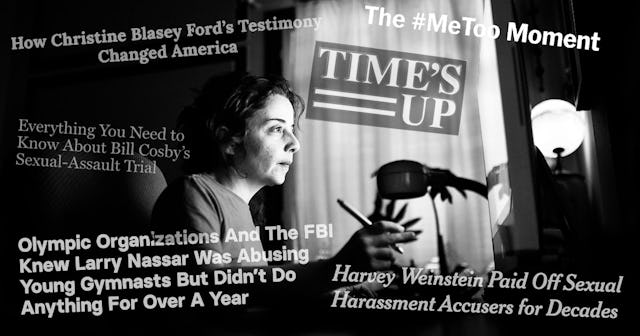Social Media Makes Healing From Sexual Trauma Especially Hard

“I can’t believe I am using my therapy time to talk about social media.” The amount of times I have heard this statement while doing therapy, well, what’s the saying? “If I had a penny…” And yet, discussion and exploration of social media, the news, the media, comedy specials, the president, and supreme court confirmation hearings have become commonplace in therapy. It is a sign of the times we live in. It is the age of the hashtag.
The week that Brett Kavanaugh was being confirmed, client after client sat across from me and expressed their triggers. Interestingly enough, it was not purely the fact that a soon-to-be sitting Supreme Court judge had been accused of rape that was bringing up memories of sexual violence they had experienced. It was the conversation that was going on around it, most specifically on social media. The long comment threads that disparaged the survivor brave enough to come forward, the assertions that it was a long time ago, the excuses, the jokes, the death threats, the non-believing.
Time after time, it is not just a heinous act or horrible assault that has the potential to be triggering. It is the conversation that accompanies it. People willing to argue until they are blue in the face (or stiff in their typing fingers) that it is okay to joke about rape, pedophilia, and domestic violence. There is a place for humor, even amongst these topics. A survivor, cracking jokes about their own experience or their survival skills, can be an empowering part of their catharsis. However, this is very different from joking about assaulting someone or directly utilizing assault/violence as the climax of a joke.
It is common for survivors to need just as much time, and sometimes more, healing from the negative reaction(s) to their disclosure about the abuse as the actual abuse itself.
Our society has functioned within rape culture, the normalization and downplaying of sexual violece, for a long time. We are not looking at a new phenomenon of oppression and acceptance of abuse, but rather, we are experiencing the effects of having so much access to the dialogues going on about it. It is extremely important that we acknowledge that this has a real and profound impact on people.
How do we heal, in a society in which social media and comments at the end of articles have become so accessible that we are privy to everyone’s “two cents?” Where one of your worst moments can be the punchline to the joke, and a good amount of people will consider this acceptable in the name of free speech and humor. And not just jokes, but the onslaught of victim blaming, disbelieving and lack of accountability that is very publicly occurring in the media among our politicians, our entertainers and so on and so forth.
In order to best understand how to undertake a healing journey within this culture, we must understand what trauma is. Trauma disrupts us. It is the unthinkable happening. It is our brains being tasked with making sense of something that does not make sense. Trauma shapes how we experience things. It can be so powerful that it can feel as though it defines who we are. It weaves its way into the fabric of our being, whispering shame, sadness, fear, and anxiety. It tells us that we are not worthy, that we are not worth being careful with, that sometimes life is not worth living. Trauma is also incredibly disempowering. The acts of assault, abuse (emotional, physical, sexual, neglect) and violence can diminish our own feelings of empowerment.
And then the outside world says “Get over it,” “You’re still thinking about that?” “Can’t you just let it go?” “That was years ago!” as if time alone can heal. We must actively work on our healing. Sitting in our trauma over a period of time, or blocking it out, is not healing. It is living with trauma.
Sometimes it is hard to participate in the journey of healing. We can believe that the bad things that happened must have happened because there is something wrong with us. When we are overly exposed to our current rape culture, it reinforces this and further shapes the context in which one must figure out how to heal.
Embarking on this healing journey in the age of the hashtag involves acknowledging and validating that our continuous exposure through our smartphones, laptops, tablets, and TVs can be an onslaught of negative messages that have the ability to denigrate our empowerment.
The journey to healing is a commitment and a way of honoring one’s self. But we cannot ignore the greater societal impact that set the scene for this journey. We cannot ignore that while someone is fighting tooth and nail to feel worthy enough to be believed and to release feelings of responsibility, there is a culture that is working in the opposite direction. That turning on the latest comedy special on Netflix, watching the news, reading comments on posts/articles will feel as though it reinforces every last one of these negative messages.
So, to the survivors: I believe in you. You are capable. You are worthy. You are deserving of feeling empowered. And to our greater society, we do not lose our ability to be funny, outspoken, or opionated when we operate from a place of treating sexual violence as unacceptable.